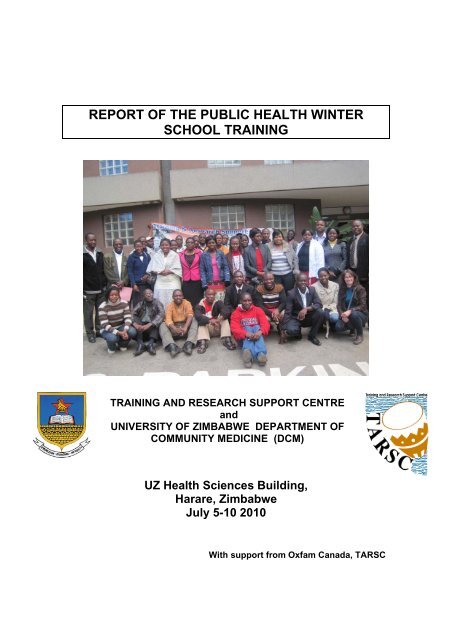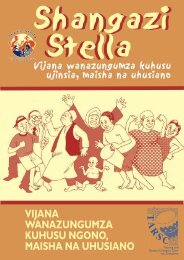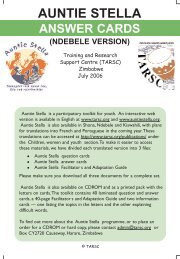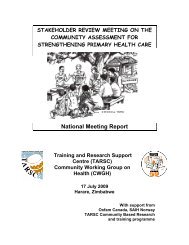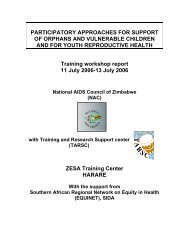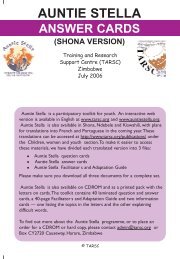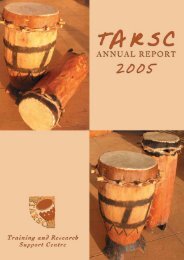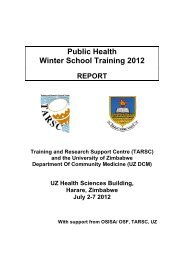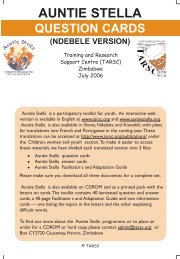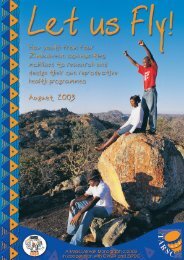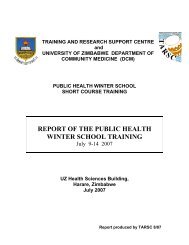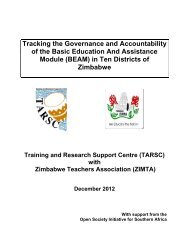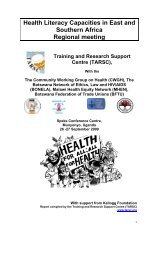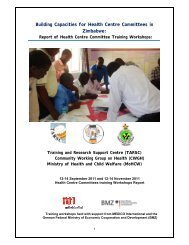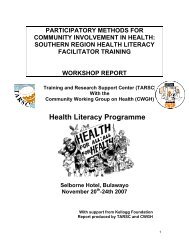WS10 Report.pdf - Training and Research Support Centre
WS10 Report.pdf - Training and Research Support Centre
WS10 Report.pdf - Training and Research Support Centre
You also want an ePaper? Increase the reach of your titles
YUMPU automatically turns print PDFs into web optimized ePapers that Google loves.
REPORT OF THE PUBLIC HEALTH WINTER<br />
SCHOOL TRAINING<br />
TRAINING AND RESEARCH SUPPORT CENTRE<br />
<strong>and</strong><br />
UNIVERSITY OF ZIMBABWE DEPARTMENT OF<br />
COMMUNITY MEDICINE (DCM)<br />
UZ Health Sciences Building,<br />
Harare, Zimbabwe<br />
July 5-10 2010<br />
With support from Oxfam Canada, TARSC
Table of Contents<br />
Executive summary..................................................................................................... 2<br />
1. Introduction ......................................................................................................... 3<br />
2. The course .......................................................................................................... 4<br />
2.1 Introduction to the course ............................................................................. 4<br />
An Introduction to public health .......................................................................... 5<br />
2.2 Introduction to epidemiology <strong>and</strong> public health............................................ 5<br />
2.3 Epidemiology of HIV <strong>and</strong> AIDS: Current situation........................................ 5<br />
2.4 Gender <strong>and</strong> reproductive health issues <strong>and</strong> services.................................. 5<br />
2.5 Epidemiology, prevention <strong>and</strong> management of TB, Typhoid Malaria <strong>and</strong><br />
Cholera................................................................................................................ 5<br />
2.6 Nutrition patterns <strong>and</strong> promoting health dietary practices ........................... 5<br />
2.7 Traditional Concepts <strong>and</strong> management of health <strong>and</strong> disease ................... 5<br />
2.8 Mentored assignment one : On Public health .............................................. 6<br />
An Introduction to health systems ...................................................................... 9<br />
2.9 Zimbabwe’s health services <strong>and</strong> district health systems ............................. 9<br />
2.10 Primary health care policies <strong>and</strong> practice .................................................. 9<br />
2.11 Ensuring <strong>and</strong> supporting health workers for Primary health care.............. 9<br />
3. Course evaluation <strong>and</strong> closing ......................................................................... 13<br />
Appendix 1: <strong>Training</strong> Programme............................................................................. 15<br />
Appendix 2: Evaluation Results................................................................................ 17<br />
Appendix 3: List of participants................................................................................. 20<br />
Cite as: <strong>Training</strong> <strong>and</strong> <strong>Research</strong> <strong>Support</strong> <strong>Centre</strong> (TARSC) University of<br />
Zimbabwe Department of Community Medicine (UZ – DCM) (2010) <strong>Report</strong><br />
of the Public Health Winter School <strong>Training</strong>, July 2010: TARSC Harare<br />
Cover photograph: Winter School 2010 participants, TARSC <strong>and</strong> UZ DCM<br />
representatives © TARSC 2010<br />
1
Executive Summary<br />
The <strong>Training</strong> <strong>and</strong> <strong>Research</strong> <strong>Support</strong> <strong>Centre</strong> (TARSC) <strong>and</strong> the University of Zimbabwe,<br />
Department of Community Medicine (UZ-DCM) held the sixth Public Health Winter School<br />
short course-training programme at UZ Health Sciences Building from the 5 th -10 th July 2010.<br />
The structure <strong>and</strong> content of the course was based on the findings from a needs <strong>and</strong><br />
capacity assessment carried out by the two institutions in 2005 <strong>and</strong> the feedback from the<br />
July 2009 Winter School course. The course has been run annually since 2010.<br />
The programme was aimed at building capacities for people working particularly at district<br />
level in health-related work, but who may not have had the benefit of formal training in<br />
health. The course included people from government, social security sector, workers<br />
representatives, health related civil society <strong>and</strong> researchers working at community level. The<br />
course aimed to build an underst<strong>and</strong>ing of public health <strong>and</strong> of health systems, particularly<br />
at district level. The course covered<br />
• Principles of public health , epidemiology <strong>and</strong> gender <strong>and</strong> reproductive health issues.<br />
• Major public health issues, including HIV <strong>and</strong> AIDS, TB, Malaria, nutrition, major non<br />
communicable diseases; hypertension, diabetes <strong>and</strong> mental health.<br />
• Elements of health systems, health financing, <strong>and</strong> human resources for health.<br />
• Zimbabwe’s health services at national, district <strong>and</strong> primary healthy care level<br />
• Community <strong>and</strong> non health sector roles in health.<br />
An open invitation was made for applicants on the TARSC website, in media <strong>and</strong> on<br />
institutional notice boards <strong>and</strong> of the pool of 85 applicants a total of 33 participants were<br />
selected attended the course, with the selection process aiming for relevance to work,<br />
gender <strong>and</strong> geographical equity <strong>and</strong> a spread of organizations <strong>and</strong> disciplines. Participants<br />
included district level officers from various government ministries, non governmental<br />
organisations, civil society <strong>and</strong> research organisations working on HIV <strong>and</strong> AIDS <strong>and</strong><br />
nutrition programmes <strong>and</strong> workers’ representatives. Participants came from or worked in<br />
various districts across the country.<br />
The resource persons <strong>and</strong> facilitators for the course came from the University of Zimbabwe,<br />
<strong>Training</strong> <strong>and</strong> <strong>Research</strong> <strong>Support</strong> <strong>Centre</strong>, Ministry of Health <strong>and</strong> Child Welfare, Zimbabwe<br />
Health Services Board (ZHSB), Non governmental organisations <strong>and</strong> United Nations<br />
agencies (Community Working Group on Health (CWGH), Elizabeth Glazier Foundation,<br />
UNFPA, UNICEF), Local government, Parliament of Zimbabwe <strong>and</strong> City of Zimbabwe <strong>and</strong><br />
Harare City Health Department. Sessions were accompanied by h<strong>and</strong>outs <strong>and</strong> course<br />
materials. Two assignments were done by the students in groups to test their public health<br />
<strong>and</strong> health systems knowledge. An end of course test was completed <strong>and</strong> all students<br />
passed.<br />
Students completed a course evaluation form at the end of the training to give feedback on<br />
the strengths <strong>and</strong> weaknesses of the training. The evaluation indicated that students found<br />
the course relevant to their work <strong>and</strong> the course useful. Students rated trainers <strong>and</strong><br />
materials as good. The majority of students understood the lectures, <strong>and</strong> found the<br />
h<strong>and</strong>outs <strong>and</strong> assignments clear <strong>and</strong> appreciated the Zimbabwe relevant content. For future<br />
courses students proposed the inclusion of various other topics not covered.<br />
The Dean of the School of Medicine Prof MM Chidzonga gave closing remarks <strong>and</strong> awarded<br />
certificates of completion to students, marking the end of the course.<br />
2
1. Introduction<br />
The University of Zimbabwe, Department of Community Medicine (UZ-DCM) together<br />
with the <strong>Training</strong> <strong>and</strong> <strong>Research</strong> <strong>Support</strong> <strong>Centre</strong> (TARSC), held the sixth Public Health<br />
Winter School short course-training programme at UZ Health Sciences Building from the<br />
5 th -10 th of July 2010. The programme has been running since 2005 <strong>and</strong> by 2009, a total<br />
of 132 participants from different organisation types have been trained (Table 1 <strong>and</strong><br />
Figure 1)<br />
Table 1: Number of participants trained in the winter school by year <strong>and</strong> sex:2005<br />
to 2009.<br />
Number of people trained<br />
Year Male Female Total<br />
2005 21 13 34<br />
2006 10 16 26<br />
2007 8 19 27<br />
2008 10 13 23<br />
2009 12 10 22<br />
Total 61 71 132<br />
Figure 1: Number of participants trained in the Winter school by year by<br />
organisation type - 2005 to 2009<br />
The Winter School<br />
programme is aimed at<br />
building capacities for<br />
people working<br />
particularly at district<br />
level in health-related<br />
work, but who may not<br />
have had the benefit of<br />
formal training in health.<br />
The course thus aims to<br />
include people from local<br />
government, from health<br />
related services <strong>and</strong><br />
sectors working in areas<br />
related to health at<br />
district level, from civil<br />
society <strong>and</strong> from<br />
community leaders with<br />
roles in health.<br />
The course aims to build an underst<strong>and</strong>ing of public health <strong>and</strong> of health systems,<br />
particularly at district level.<br />
The course covered<br />
• Principles of public health , epidemiology <strong>and</strong> gender <strong>and</strong> reproductive health issues.<br />
• Major public health issues, including HIV <strong>and</strong> AIDS, TB, Malaria, nutrition, major non<br />
communicable diseases; hypertension, diabetes <strong>and</strong> mental health.<br />
• Elements of health systems, health financing, <strong>and</strong> human resources for health.<br />
• Zimbabwe’s health services at national, district <strong>and</strong> primary healthy care level<br />
• Community <strong>and</strong> non health sector roles in health.<br />
3
Participants were selected from applicants to an open call, <strong>and</strong> a total of 33 participants<br />
attended the course. Participants included district level officers from various government<br />
ministries, non governmental organisations, civil society <strong>and</strong> research organisations<br />
working on HIV <strong>and</strong> AIDS <strong>and</strong> nutrition programmes <strong>and</strong> workers’ representatives.<br />
Participants came from or worked in various districts across the country. The full list of<br />
participants is shown in Appendix 3.<br />
The course involved teaching, presentations <strong>and</strong> mentored assignments. The course<br />
programme is shown in Appendix 1. Students carried out two mentored assignments<br />
during the course to consolidate their knowledge in areas of Public health, <strong>and</strong> Health<br />
systems.<br />
H<strong>and</strong>outs were provided for each session in the programme, <strong>and</strong> a list of reference<br />
materials <strong>and</strong> useful websites made available for follow up reading on subject areas. An<br />
end of course test was completed <strong>and</strong> certificates of completion were given at the end of<br />
the course.<br />
The resource persons <strong>and</strong> facilitators for the course came from the University of<br />
Zimbabwe, <strong>Training</strong> <strong>and</strong> <strong>Research</strong> <strong>Support</strong> <strong>Centre</strong>, Ministry of Health <strong>and</strong> Child Welfare,<br />
Zimbabwe Health Services Board (ZHSB), Non governmental organisations <strong>and</strong> United<br />
Nations agencies (Community Working Group on Health (CWGH), Elizabeth Glazier<br />
Foundation, UNFPA, UNICEF), Local government, Parliament of Zimbabwe <strong>and</strong> City of<br />
Harare Health Department. Sessions were accompanied by h<strong>and</strong>outs <strong>and</strong> course<br />
materials. Two assignments were done by the students in groups to test their public<br />
health <strong>and</strong> health systems knowledge. An end of course test was completed <strong>and</strong> all<br />
students passed.<br />
Students completed a course evaluation form at the end of the training to give feedback<br />
on the strengths <strong>and</strong> weaknesses of the training. The evaluation indicated that students<br />
found the course relevant to their work was useful. The full results of the evaluation are<br />
shown in Appendix 2.<br />
The course was jointly administered by UZ DCM <strong>and</strong> TARSC. Proceedings of the one<br />
week training course are briefly outlined below. A full set of h<strong>and</strong>outs <strong>and</strong> reading<br />
materials is provided with the course. The sessions provided time for questions <strong>and</strong><br />
discussion- these elaborate discussions are not reported here but were an essential<br />
element of each session. Mentors inputs to participants’ group assignments are however<br />
reported in brief as are the discussions in the panel discussion on non health sector<br />
roles in health.<br />
2. The course<br />
2.1 Introduction to the course<br />
Dr Rene Loewenson (TARSC Director) <strong>and</strong> Professor S Rusakaniko (UZ DCM Chair)<br />
welcomed the participants to the course. Participants introduced themselves, noting their<br />
areas of work <strong>and</strong> expectations from the training. Dr Rene outlined the background to<br />
the course, course overview, target audience <strong>and</strong> objectives (as highlighted in the<br />
introduction above). She stressed that follow ups on the use of the course would be<br />
done to evaluate the effectiveness of the training <strong>and</strong> identification of any further gaps in<br />
skills. Professor Rusakaniko went through the programme (as shown in Appendix 1)<br />
highlighting the issues to be covered <strong>and</strong> their relevance.<br />
4
An Introduction to public health<br />
2.2 Introduction to epidemiology <strong>and</strong> public health<br />
Dr Rene Loewenson TARSC, gave a general introduction to the principles of public<br />
health <strong>and</strong> key concepts in epidemiology <strong>and</strong> how they are used in public health. She<br />
defined public health, <strong>and</strong> outlined using examples the basic elements of public health,<br />
the measures <strong>and</strong> concepts in epidemiology, how the data is collected <strong>and</strong> used <strong>and</strong><br />
how it is applied to address public health.<br />
2.3 Epidemiology of HIV <strong>and</strong> AIDS: Current situation.<br />
Dr A Mahomva (Elizabeth Glazier Pediatric HIV <strong>and</strong> AIDS Foundation) gave an outline<br />
of the epidemic pattern of HIV <strong>and</strong> AIDS: the transmission <strong>and</strong> natural history of AIDS<br />
<strong>and</strong> the trends globally <strong>and</strong> in Zimbabwe of the epidemic. She went on to inform<br />
delegates of the distribution <strong>and</strong> determinants of HIV, <strong>and</strong> the current levels <strong>and</strong> trends<br />
in the HIV <strong>and</strong> AIDS epidemic through prevalence, incidence <strong>and</strong> mortality statistics.<br />
She used the evidence to describe patterns of vulnerability <strong>and</strong> susceptibility in HIV <strong>and</strong><br />
AIDS <strong>and</strong> the major public health challenges <strong>and</strong> the opportunities for responses.<br />
2.4 Gender <strong>and</strong> reproductive health issues <strong>and</strong> services<br />
Mrs T Chinhengo (UNFPA) gave a lecture on gender <strong>and</strong> reproductive health issues<br />
covering Introduction to reproductive health, Elements of reproductive health including<br />
reproductive health indicators, Gender concepts, analysis tools <strong>and</strong> linking gender <strong>and</strong><br />
finally linked gender to reproductive health.<br />
2.5 Epidemiology, prevention <strong>and</strong> management of TB, Typhoid Malaria <strong>and</strong><br />
Cholera<br />
Dr C Duri (City of Harare Health Department) covered the epidemiology of Tuberculosis<br />
(TB). History of TB, sources of infection, Risk, TB control <strong>and</strong> treatment. He outlined the<br />
current TB trends including the new MDR strains. He then covered the conceptual<br />
framework of the Stop TB Strategy, covering the six elements in detail. On typhoid, he<br />
covered, the epidemiology, sources of infection, signs <strong>and</strong> symptoms <strong>and</strong> diagnosis,<br />
complications <strong>and</strong> treatment.<br />
On Malaria Dr G Gonese (Harare City Health Department) presented on the<br />
epidemiology of malaria, the burden of malaria, malaria transmission in Africa,<br />
Zimbabwe <strong>and</strong> its burden on Health Systems, economies <strong>and</strong> in society in general. She<br />
also provided information on cholera in which she covered causes, signs <strong>and</strong> symptoms,<br />
policies <strong>and</strong> strategies for effective cholera prevention <strong>and</strong> control at district <strong>and</strong><br />
community level.<br />
2.6 Nutrition patterns <strong>and</strong> promoting health dietary practices<br />
Mrs R Madzima (Nutrition Consultant) gave a lecture on nutrition, defining terms <strong>and</strong><br />
outlining the major elements of individual, household, <strong>and</strong> national food needs, how<br />
these are met <strong>and</strong> the elements of malnutrition. She outlined the impact of HIV <strong>and</strong> AIDS<br />
on nutrition <strong>and</strong> the nutritional requirements for people living with HIV <strong>and</strong> AIDs. She<br />
presented the national policies for food security <strong>and</strong> nutrition <strong>and</strong> how the interventions<br />
on nutrition interact with wider health issues.<br />
2.7 Traditional Concepts <strong>and</strong> management of health <strong>and</strong> disease<br />
Mrs T G Monera (Lecturer- UZ School of Pharmacy) presented on the definitions of key<br />
terms in traditional medicine <strong>and</strong> practice <strong>and</strong> then highlighted the global, regional<br />
(Africa) <strong>and</strong> local (Zimbabwe) prevalence <strong>and</strong> reasons for use of traditional medicine.<br />
5
She then covered the effects of traditional medicine on the management of health <strong>and</strong><br />
disease <strong>and</strong> its integration with conventional health systems. Mrs Monera also covered<br />
Zimbabwe Law on traditional medicine, traditional doctors training <strong>and</strong> distribution,<br />
research <strong>and</strong> the value of traditional medicine to health <strong>and</strong> disease control. Finally, she<br />
noted the current trends, issues <strong>and</strong> obstacles in traditional medicine <strong>and</strong> practice <strong>and</strong><br />
suggestions on how these could be addressed.<br />
2.8 Mentored assignment one : On Public health<br />
This exercise aimed to use the teaching on public health to test how participants, as public<br />
health practitioners would apply the knowledge gained in the course to develop an action<br />
plan for the most important health problem in their district <strong>and</strong> use available resources to<br />
address this problem through approaches outside the curative health services. Participants<br />
were asked to prepare an intervention plan in groups of six <strong>and</strong> presented their plans in<br />
plenary. Groups outlined their problems, proposed interventions, programme content, target<br />
groups <strong>and</strong> stakeholder involvement with guidance from Prof S Rusakaniko as summarised<br />
in table 2 below<br />
Table 2: Assignment 1: Consolidated Group <strong>Report</strong>s<br />
Group Title of Content of Proposal<br />
Number Proposal<br />
Group<br />
One<br />
Diarrhea in<br />
Mwenezi<br />
District<br />
Introduction: Following the heavy morbidity <strong>and</strong> mortality rates is on the increase in<br />
the district. Evidence suggests the rates are high due to lack of clean water.<br />
Proposed Intervention: Provide clean drinking water through rehabilitation of<br />
boreholes, constructing toilets, capacity building in hygiene.<br />
Target group: The whole community<br />
Partnerships: Ministry of Health, Local Government, District Development Fund,<br />
<strong>and</strong> local NGOs based in the district <strong>and</strong> the private sector.<br />
Community Involvement: Pprovision of bricks for the rehabilitation of communal<br />
water drinking points, provide labour, dig their toilets <strong>and</strong> organize bricks, river <strong>and</strong><br />
pit s<strong>and</strong> <strong>and</strong> other local materials.<br />
Indicators: public meeting attendance <strong>and</strong> participation, diarrhoea related morbidity<br />
<strong>and</strong> mortality, number of toilets constructed <strong>and</strong> water points rehabilitated<br />
Group<br />
Two<br />
Group<br />
Three<br />
Response to<br />
malnutrition in<br />
Goromonzi<br />
District<br />
Adolescent<br />
<strong>and</strong><br />
Reproductive<br />
Health<br />
Program in<br />
Beitbridge<br />
Introduction. Malnutrition has been a major cause of morbidity <strong>and</strong> mortality within<br />
Goromonzi <strong>and</strong> mainly affected the under 5's<br />
Proposed Intervention: Nutrition education to increase the number of people with<br />
good feeding practices through awareness campaigns health clubs, capacity<br />
building, drama, focus group discussions ,road shows <strong>and</strong> food wares.<br />
Target group: under 5's, caregivers of under 5s, regnant <strong>and</strong> lactating women.<br />
Partnerships: MoAgriculture, Local Government <strong>and</strong> District Aids Committee.<br />
Community Involvement: Mobilisation, M&E of health clubs, participation of men in<br />
health clubs.<br />
Indicators: Number of under 5's recorded who are underweight, reduction in<br />
incidence rat, number of functional clubs formed -reduction in death rate, number of<br />
care givers knowledgeable on good feeding practices, KAP survey<br />
Introduction: Beitbridge, being a border town, is a hype of socio-economic<br />
activities. The issue of STI’s in the district has been on the increase based on<br />
statistics from the District Hospital.<br />
Proposed Intervention: Education & Income generating projects will be the key<br />
method. The team has identified risk factors that lie in the district which are<br />
contributing to the increase of STI’s i.e. unemployment, migration, truck drivers, high<br />
school drop outs, poverty <strong>and</strong> brothels. Due to these risk factors, there has been an<br />
increase in risky sexual activities like CSW <strong>and</strong> the small house saga etc. Proposed<br />
actions to decrease STI’s amongst the youth is Peer education(TOT),IEC material<br />
production & distribution, Condom promotion & distribution, Advocacy, Awareness<br />
Campaigns(include Behaviour change), Health Education & Promotion, YES,<br />
engaging other stakeholders, Flea Markets<br />
Target group: Both male <strong>and</strong> female adolescents (15-23)<br />
Partnerships: MoHCW, DAC, MoEnterprise Development, MoYouth, Town Council,<br />
ZRP (VFU)<br />
Community Involvement: The community needs to be sensitized on the program,<br />
6
Group 4<br />
Group<br />
Five<br />
Group<br />
Six<br />
Malaria<br />
Prevention in<br />
Chiredzi<br />
Cholera<br />
outbreak in<br />
Zvishavane<br />
Urban<br />
Malaria in<br />
Mwenezi<br />
the community should identify their peer educators, influential leaders in the<br />
community can be approached (role models)<br />
Indicators: No. of STI cases being reported(incidence <strong>and</strong> prevalence rate),<br />
number of condoms being distributed, number of trainings held, increase in the IEC<br />
being distributed, created social activities, number of out of school youth employed<br />
Introduction: Chiredzi has high temperatures <strong>and</strong> incidence <strong>and</strong> mortality rates<br />
from malaria have been on the increase.<br />
Proposed Intervention: <strong>Training</strong> health workers, Health Education on causes<br />
,prevention <strong>and</strong> control of Malaria, distribution of IEC material, Distribution of Long<br />
lasting Insecticide treated Nets( LLITN), indoor residual spraying (IRS), Larvidicing<br />
Target group: Children under 5 years, pregnant woman, lactating mothers, people<br />
living with HIV/AIDS.<br />
Partnerships: Local government e.g. Chiefs, headmen, Ministry of Education <strong>and</strong><br />
culture, women action groups, NGOs, family based organisations, the community at<br />
large.<br />
Community Involvement: MoEducation, community volunteers <strong>and</strong> health workers<br />
– distribution of IEC material; Distribution of nets-trained community volunteers;<br />
Monitoring use of nets-trained village health workers; IRS –trained youths in the<br />
community.<br />
Indicators: Reduction in malaria incidence reported at health institutions in the<br />
district, rreduction in the number of deaths due to malaria, increase in the number of<br />
people with access to treated nets, IRS percentage coverage, number of health<br />
workers trained, number of health education sessions conducted.<br />
Introduction: The urban area is characterised by poor living conditions, with burst<br />
sewer pipes <strong>and</strong> erratic water supplies, with mostly crowded houses.<br />
Proposed Intervention: The District Health Executive came up with the following<br />
measures to prevent further spread of cholera in the urban area: Health education<br />
sessions, Public awareness campaigns, Provision of clean water , Sewer<br />
rehabilitation, Distribution of hygiene kits, Advocacy<br />
Target groups: School children, Religious groups, mothers/caregivers, men at<br />
public drinking <strong>and</strong> recreation places, general community<br />
Partnerships: Urban council-water <strong>and</strong> sewer system, residents’ association, Min of<br />
Education, Civil protection unit, local government<br />
Community involvement: The urban community will mainly be involved through<br />
their representatives, who include councillors <strong>and</strong> residents’ association, Councillors<br />
<strong>and</strong> the residents’ will help in community mobilisation, to ensure that awareness is<br />
raised.IEC material including pamphlets <strong>and</strong> posters will be designed in appropriate<br />
local language.<br />
Impact Indicators: Number of new confirmed cholera cases, Number of deaths due<br />
to cholera, % of households within 500m of safe water source, % increase in<br />
households practicing safe hygiene practices.<br />
Introduction: Each year around 200 people die of clinical malaria, 80% of which are<br />
children <strong>and</strong> pregnant mothers.<br />
Proposed Intervention: Ccommunity outreach, supply insecticides treated nets<br />
ITNs, indoor residual spraying, malaria prevention during pregnancy (<strong>and</strong> other<br />
target groups), prompt, effective anti-malaria treatment (prophylaxis).<br />
Target group: Pregnant women, under fives, children up to 12 years, households.<br />
Partnerships: MOHCW,MoEducation, local Government, NGOs<br />
DAAC<br />
Community Involvement: Sensitisation meetings with local leadership, Situational<br />
analysis, monitoring <strong>and</strong> evaluation, hhousehold surveys / Heath facility survey,<br />
net-making, school <strong>and</strong> community campaigns <strong>and</strong> competitions<br />
Indicators: % of under 5yr children (<strong>and</strong> other target groups) with uncomplicated<br />
malaria correctly managed at health facilities, % of U5 children (<strong>and</strong> other target<br />
group) with severe malaria <strong>and</strong> correctly managed at health facilities, % of children<br />
U5s sleeping under <strong>and</strong> insecticide treated nets (ITN), % of pregnant women (<strong>and</strong><br />
other target groups) sleeping under ITN, % of households with at least 3 ITNs or<br />
Indoor residual spraying, incidence of confirmed malaria case.<br />
The mentor- Prof S Rusakaniko raised several points <strong>and</strong> gave feedback to the group<br />
presentations as summarized in the box below;<br />
7
1. Teams were not identifying themselves (no names) on the presentations<br />
2. Problem statements were not clear. It was difficult to see the problem. Proposals<br />
should put the intended recipient into the shoes of the person making the proposal.<br />
In some cases, the problem statement was not fitting well with the interventions. A<br />
clear justification of the intervention should be made.<br />
3. The interventions were not well presented. Groups needed to go into the core of the<br />
problem <strong>and</strong> justify why the interventions are being done. Some of the interventions<br />
were not appropriate to the background information.<br />
4. Sustainability of interventions should also be considered.<br />
5. Identification of stakeholders <strong>and</strong> level of participation was not well articulated.<br />
6. The target groups were sometimes vague, <strong>and</strong> inappropriate.<br />
7. Local stakeholders needed to be specifically stated e.g. chiefs, councillors<br />
8. There is need to make indicators clear <strong>and</strong> measurable against some baselines.<br />
Some indicators related to rural areas yet interventions were being done in an urban<br />
area.<br />
9. Community participation need to be clearly spelt out, i.e specify who does what.<br />
10. There is need to follow the prescribed format when doing proposals.<br />
11. Most groups did not include budgets yet these are very critical in proposals.<br />
Prof S Rusakaniko said that he would prepare <strong>and</strong> circulate to participants a document<br />
on writing proposals.<br />
8
An Introduction to health systems<br />
2.9 Zimbabwe’s health services <strong>and</strong> district health systems<br />
Dr P Manangazira (Ministry of Health & Child Welfare), presented a lecture on<br />
Zimbabwe’s health systems. She outlined the MOH&CW vision <strong>and</strong> mission, the<br />
organogram for the ministry <strong>and</strong> the health care providers in Zimbabwe. Her<br />
presentation covered the relationships <strong>and</strong> operational context of the different providers,<br />
<strong>and</strong> the roles <strong>and</strong> responsibilities of different levels of the health system. She also<br />
explained the composition of district health executives <strong>and</strong> Hospital Advisory Boards.<br />
She also noted the importance of community participation at all levels of the health<br />
system.<br />
2.10 Primary health care policies <strong>and</strong> practice<br />
Mrs J Maradzika (UZ-DCM) introduced the concepts of Primary Health Care (PHC). She<br />
gave a background to PHC, its attributes <strong>and</strong> components <strong>and</strong> the PHC policies <strong>and</strong><br />
practices in Zimbabwe within the context of the overall National Healthy policy<br />
framework <strong>and</strong> the mission <strong>and</strong> core values of the MOHCW. She gave examples of<br />
different aspects of PHC as practiced in Zimbabwe, <strong>and</strong> the value of these approaches<br />
in addressing the major health burdens.<br />
2.11 Ensuring <strong>and</strong> supporting health workers for Primary health care<br />
Dr L Mbengeranwa ( Chair- Zimbabwe Health Services Board) outlined the structure of<br />
health service delivery in Zimbabwe. He then briefly outlined primary health care<br />
approaches in health delivery <strong>and</strong> district health services; - composition, current staffing<br />
levels <strong>and</strong> challenges. He noted <strong>and</strong> explained the findings of the Commission of review<br />
into the health sector <strong>and</strong> the birth of the Health Services Board. Dr Mbengeranwa<br />
outlined the functions of the ZHSB. Lastly, he gave a lecture on current conditions of<br />
service in the health sector <strong>and</strong> retention initiatives, noting the need for multi-sectoral<br />
approaches in policy formulation <strong>and</strong> implementation to retain human resources for<br />
health using both financial <strong>and</strong> non financial incentives.<br />
2.12 Managing chronic <strong>and</strong> non communicable diseases: Diabetes,<br />
hypertension <strong>and</strong> mental health<br />
A new session was included on non communicable diseases in 2010. Mrs D Sithole<br />
(MoHCW) gave a lecture on common mental health disorders, their causes, signs <strong>and</strong><br />
symptoms. She highlighted the various policies <strong>and</strong> actions that can be taken at<br />
national, district <strong>and</strong> community level to deal with mental health problems. She also<br />
outlined the various Ministry of Health activities at different levels of care aimed at<br />
improving mental health delivery systems in Zimbabwe.<br />
Dr C Duri (Harare City Health Department) outlined the causes, presentations <strong>and</strong><br />
complications of diabetes as a major chronic disease. He then noted its diagnosis,<br />
management <strong>and</strong> investigation. On treatment, assessment <strong>and</strong> control, Dr Duri noted<br />
the need for proper education of patients on appropriate diets <strong>and</strong> management of blood<br />
pressure.<br />
2.13 Health care financing: Budgeting <strong>and</strong> resource allocation at<br />
district level<br />
Mr Shepherd Shamu (TARSC), gave a presentation on health care financing in<br />
Zimbabwe. He described the health financing flows between purchasers, providers <strong>and</strong><br />
consumers in Zimbabwe <strong>and</strong> how these are reflected in national health accounts in<br />
Zimbabwe. He discussed the major resource mobilization, resource allocation<br />
approaches for health <strong>and</strong> their equity, adequacy, effectiveness <strong>and</strong> efficiency, the<br />
9
national policy goals for health financing <strong>and</strong> their reflection in budget <strong>and</strong> resource<br />
allocation policies <strong>and</strong> strategies.<br />
2.14 Mechanisms for community participation in health<br />
Mr I Rusike (Community Working Group on Health Director), presented the concepts<br />
<strong>and</strong> levels of organization of community <strong>and</strong> of participation in health, the mechanisms<br />
for community participation in PHC <strong>and</strong> district health systems, He talked about the role<br />
of civil society, of individuals <strong>and</strong> of households <strong>and</strong> the mechanisms for co-operation<br />
with health service providers <strong>and</strong> within wider intersectoral action for health. He also<br />
explained the composition <strong>and</strong> functions of a Health <strong>Centre</strong> Committees, giving practical<br />
examples of how these have been useful in improving health delivery in selected districts<br />
in Zimbabwe, for instance in Bindura Nyava.<br />
2.15 Assignment two: Fair financing of primary care level health<br />
systems<br />
This exercise was aimed at evaluating ho participants would apply the knowledge gained on<br />
district health systems (structure, financing, human resources, community participation).this<br />
knowledge. The assignment was on fairly financing comprehensive primary health care<br />
services within districts. Participants were asked, in groups, to report on choices <strong>and</strong><br />
measures for strengthening fair financing for primary health care <strong>and</strong> clinic services<br />
Noting the thrust of the MoHCW to revitalise the Primary Care Approach to address health<br />
needs of the nation (as outlined in the 2010 Zimbabwe Health Sector Investment Strategy)<br />
as well as the fundamentals of fair financing, the assignment tested the participants’ capacity<br />
<strong>and</strong> skills to;<br />
Indentify the criteria that they would propose to inform choices about how available<br />
financial resources (national or district) are used, given the scarcity of resources<br />
Identify new or additional sources of funding that they would propose to<br />
improve the level of resources for community <strong>and</strong> clinic services as well as<br />
issues to be considered in planning collection <strong>and</strong> management of the funds.<br />
Give <strong>and</strong> justify their position on what should happen with user fees at clinic<br />
level, i,e if applicable, explain who they should be collected from, for what <strong>and</strong><br />
how they should be managed <strong>and</strong> used. If non applicable, explain what they<br />
would need to do to ensure the policy is effective.<br />
The three groups reported back in plenary, <strong>and</strong> the summary of reports is shown in table<br />
3 below.<br />
Table 3: Assignment 2: Consolidated Group <strong>Report</strong>s<br />
Group Number Criteria for allocation of resources<br />
Group 1<br />
Major contributors to mortality <strong>and</strong> morbidity, i.e history.<br />
Essential medical supplies<br />
Staff retention <strong>and</strong> motivation considerations<br />
Allocation by department eg maternal department<br />
Community involvement- prioritization<br />
Data analysis of major contributors to morbidity <strong>and</strong> mortality<br />
District plans <strong>and</strong> guidelines.<br />
Emergency cases eg cholera<br />
Group 2<br />
Needs, eg drugs<br />
Mortality <strong>and</strong> morbidity<br />
Cost effectiveness of interventions<br />
Group 3<br />
Morbidity <strong>and</strong> mortality<br />
History- previous deficits <strong>and</strong> surpluses<br />
10
Population <strong>and</strong> population groups<br />
Infrastructure <strong>and</strong> equipment<br />
Promotive <strong>and</strong> preventive programmes rather than curative<br />
The feedback on user fees was moderated in the form of a TV panel debate, with each group<br />
represented by a panelist, <strong>and</strong> participants giving feedback <strong>and</strong> asking questions on the topic<br />
“should user fees be abolished?”.<br />
In the group work all three groups felt some fees should be applied in some levels of services, with<br />
exemptions for chronic patients, children below five years, orphans <strong>and</strong> vulnerable children, destitute<br />
<strong>and</strong> pregnant women. One group noted that the social welfare department should provide assistance<br />
to destitutes.<br />
In the panel debate, it was noted that the social welfare department is not functional hence the need<br />
for more robust frameworks to assist the low income <strong>and</strong> vulnerable groups. It was also noted that<br />
identifying groups that fall into the exemption category may be difficult at clinic level. Some groups<br />
proposed that the level of user fees <strong>and</strong> definitions for those in the exemption category be defined by<br />
the community. Some participants suggested that Health <strong>Centre</strong> Committees determine the levels of<br />
user fees. Participants felt that the health delivery system is in a transition period; <strong>and</strong> user fees<br />
should stay as we move towards more sustainable equitable health financing mechanisms like a<br />
National Health Insurance Scheme. The user fees could be administered at the HCC level for such<br />
costs as administration <strong>and</strong> maintenance of equipment <strong>and</strong> infrastructure.<br />
However, other participants noted that the user fees may be too insignificant to the revenue of the<br />
health facility, exemptions may be difficult to implement, encourage stigmatization, are regressive, can<br />
be abused <strong>and</strong> discourage links with health facilities.<br />
Dr Rene shared with participants’ evidence from the region <strong>and</strong> Zimbabwe on user fees. She noted<br />
that user fees have been shown to affect access to health services. Evidence shows that user fees<br />
may cause people to delay visiting health services, only doing so when the condition has worsened<br />
further raising costs of curative care. They should also be viewed in the context of other costs that<br />
households are paying to access health care, for instance transport costs. Participants identified<br />
employers, donors, health insurance, companies, levies from local authorities <strong>and</strong> taxes as other<br />
possible sources of funding.<br />
Dr Rene gave facilitated a discussion <strong>and</strong> gave feedback on the criteria for resource<br />
allocation, noting that the groups had shared <strong>and</strong> different criteria. The box below<br />
summarises the discussion on this area<br />
<br />
<br />
<br />
<br />
Need based: Disease burden is a reflection of health needs, <strong>and</strong> resources are<br />
always allocated to health needs. Assessing needs through health facility<br />
statistics is measuring health dem<strong>and</strong> <strong>and</strong> not health needs. Health needs are<br />
assessed in the community through surveillance <strong>and</strong> surveys. Participants<br />
concurred that the current allocation of resources to districts is based on health<br />
dem<strong>and</strong>.<br />
Capacity to absorb: This is also considered when allocating resources. Such<br />
issues like health staff, facilities needed to run programmes are also vital. Thus,<br />
resources need to be allocated where there is capacity for them to be spent <strong>and</strong><br />
utilized.<br />
Fundamental rights: Resources may be allocated based on whether the<br />
programmes that are regarded as fundamental rights eg water <strong>and</strong> immunization<br />
of children. There is need for these rights based needs to be costed. Dr Rene<br />
noted that the current constitution of Zimbabwe does not protect these rights.<br />
These rights should be progressively realized <strong>and</strong> should be in the constitution<br />
<strong>and</strong> in public health law.<br />
Cost benefit consideration, i.e what health benefit is being realized from the<br />
programme.<br />
11
Community/ District preferences: Resource allocation should not be totally<br />
guided by this as the community may not be seeing the need, for instance<br />
chronic diseases. There is need to dialogue more with the community <strong>and</strong> get<br />
evidence of needs since those with power normally decide what to do.<br />
Dr Rene noted that that people can make a difference at district level even with the few<br />
resources that are allocated from central government provided these are allocated to<br />
areas of need.<br />
2.15 Panel discussion: Non health sector roles in health:<br />
The panel discussion session was chaired by Dr G Gonese <strong>and</strong> papers were presented<br />
<strong>and</strong> discussed by the following;<br />
Dr D Parirenyatwa (Chair of the Parliamentary Committee on Health, Parliament<br />
of Zimbabwe) - Key roles played by the Parliament in Health.<br />
Mrs S Chitsungo (Health Specialist- UNICEF) – Role of International Agencies in<br />
<br />
Health.<br />
Mr R Mozhentiy (Interim Secretary General, Zimbabwe Local Government<br />
Association) – Role of Local Government in Health<br />
Their presentations outlined the roles in intersectoral action for health, how they are<br />
linked to the health sector <strong>and</strong> health services <strong>and</strong> to district level health interventions.<br />
All the sessions were followed by discussions of issues raised by students <strong>and</strong> the<br />
facilitators. The panel <strong>and</strong> participants noted that;<br />
Members of Parliament should correctly carry out their representative function<br />
<strong>and</strong> should articulate such issues like transport <strong>and</strong> user fees on behalf of their<br />
constituencies.<br />
The issue of scrapping traditional birth attendants need to be revisited, especially<br />
when no mechanisms to fill the gaps they will leave are not yet in place.<br />
Parliament should adequately debate the National Health Insurance Scheme,<br />
this should be implemented across a wider base of employees <strong>and</strong> not burden<br />
the already burdened few workers.<br />
The training <strong>and</strong> incentives for Village Health Workers need to be st<strong>and</strong>ardized.<br />
Actors in health need to come up with a minimum package for interventions, as<br />
some districts reported some organisations giving school pencils as<br />
interventions.<br />
Monitoring <strong>and</strong> st<strong>and</strong>adisation of organisations’ overheads is important as very<br />
little sometimes goes directly to benefit communities.<br />
Local authorities should not divert resources that are being paid for specific<br />
purposes, eg refuse collection.<br />
2.16 Presentation Skills<br />
Ms B Kaim TARSC, facilitated on presentation skills <strong>and</strong> key points for preparing <strong>and</strong><br />
delivering presentations <strong>and</strong> for using visual aids. Students showed much interest this<br />
session <strong>and</strong> used the skills they had learnt in preparing <strong>and</strong> presenting their<br />
assignments.<br />
2.17 Test of knowledge<br />
Participants completed a test designed to assess the levels of knowledge. The test<br />
assessed knowledge on content raised in the lecture sessions <strong>and</strong> was aimed to assess<br />
the extent to which materials were understood by students. All students passed the test.<br />
The answers were discussed with the students by Dr Loewenson on the last day.<br />
12
3. Course evaluation <strong>and</strong> closing<br />
3.1 Course evaluation<br />
Participants completed a course evaluation form at the end of training. Twenty nine of<br />
the thirty three participants to the course completed the evaluation forms. This was<br />
aimed to collect feedback on the strengths <strong>and</strong> weaknesses of the training programme<br />
for future planning.<br />
All (100%) of those completing the evaluation found the Winter school course relevant to<br />
their work. All participants (100%) noted that the course is very useful. Nearly all (97%)<br />
reported that the trainers were good, 38% rated the course materials as good <strong>and</strong> a<br />
further 62% noted that the materials were very good. The detailed results are shown in<br />
Appendix 2. Generally students understood the lectures, with some partially<br />
underst<strong>and</strong>ing some areas .Some sessions were less well understood than others; at<br />
least one participant noted that they had not understood the following teaching sessions;<br />
Epidemiology, prevention <strong>and</strong> management of major communicable diseases:<br />
TB, Cholera, Malaria <strong>and</strong> typhoid.<br />
Nutrition patterns <strong>and</strong> promoting healthy dietary practices<br />
Traditional concepts <strong>and</strong> management of health <strong>and</strong> disease<br />
Primary health care policies <strong>and</strong> practice<br />
Health care financing: resource mobilization, budgeting <strong>and</strong> resource allocation<br />
at district level<br />
Mechanisms for community participation in health<br />
Co-coordinating <strong>and</strong> involving different roles in health at district level<br />
Participants also noted that more time was needed for the course. They felt that through<br />
the course they had gained a broader understating of public health issues <strong>and</strong> said that<br />
they would share this knowledge with their organisations <strong>and</strong> workplaces. They also<br />
noted that the course would help them implement public health programmes in their<br />
areas of work to advance public health at community level. Sessions were highly rated<br />
as relevant <strong>and</strong> useful .H<strong>and</strong>outs <strong>and</strong> assignments were also rated as clear <strong>and</strong> useful.<br />
Nearly four fifths (79%) of the participants found assignment 1 on district health services<br />
to be clear <strong>and</strong> useful while 93% felt Assignment 2 on health financing to be clear <strong>and</strong><br />
useful. The full results are shown in Appendix 2.<br />
3.2 Follow up discussion <strong>and</strong> priorities<br />
Professor S Rusakaniko observed that it was very easy to get training but difficult to<br />
practice. The participants were now equipped with skills <strong>and</strong> were urged to apply them to<br />
ensure evidence based programming in their areas of work. He noted that the course<br />
was just the beginning of opportunities into public health. On opportunities for further<br />
study <strong>and</strong> training, Prof Rusakaniko outlined the structure <strong>and</strong> requirements into the<br />
programmes offered by the UZ DCM, namely;<br />
Masters in Public Health (Both on part time <strong>and</strong> fulltime)<br />
Diploma in Environmental Health<br />
<br />
<br />
Bachelor of Science in Health <strong>and</strong> Environment<br />
Short courses offered in conjunction with BRTI. Currently there are 16 courses<br />
being offered, including epidemiology, research methods, data management,<br />
ethics in research, laboratory practice <strong>and</strong> quality control<br />
The need for a well defined career path structure in the future was noted. Participants<br />
noted that there is a lot of uncoordinated training going on in Zimbabwe <strong>and</strong> these<br />
needed to be coordinated. The need to differentiate academic training from employment<br />
development training was also highlighted.<br />
13
Dr Rene Loewenson advised the participants that a follow up on what the participants<br />
will be doing after the training would be done three months after the training. She also<br />
invited participants to subscribe to the EQUINET newsletter, which includes information<br />
on health from the region.<br />
Participants made suggestions on areas to improve in the future:<br />
Include project monitoring <strong>and</strong> evaluation, or, noting that this is a course in its<br />
own right, build this into one of the assignments to strengthen this capacity<br />
Instead of the panel discussion on non health sector roles in health, perhaps<br />
have a session on intersectoral action for health <strong>and</strong> have presentations from<br />
different sectors.<br />
Review the nutrition session content.<br />
Include in sessions examples of promising practices that people can draw on;<br />
Participants also noted the need for training in managing data <strong>and</strong> evidence.<br />
Participants concurred that all the content in the syllabus was relevant. Dr Rene<br />
indicated that a follow up evaluation would be carried out after three months to find out<br />
how participants had used the training <strong>and</strong> they could further advise on areas for<br />
improvement at that stage.<br />
3.3 Closing<br />
To orient Professor M Chiodzonga, Dr Rene Loewenson gave a background on the<br />
course <strong>and</strong> the different disciplines <strong>and</strong> organizational backgrounds of the participants.<br />
She was encouraged the team had a vision for public health for the future. She<br />
acknowledged the good gender <strong>and</strong> geographic representation of the participants. Dr<br />
Loewenson thanked the team at TARSC, especially Artwell Kadungure, for their work on<br />
the course, thanked the staff at UZ DCM for their support <strong>and</strong> input, particularly Prof<br />
Rusakaniko, <strong>and</strong> expressed appreciation for the long collaboration between TARSC <strong>and</strong><br />
UZ DCM on the course <strong>and</strong> other areas. She also noted the support of TARSC,<br />
UZDCM, CIDA/Oxfam Canada, <strong>and</strong> the delegates <strong>and</strong> their organizations for the costs<br />
of the course.<br />
Professor M Chidzonga (Dean UZ DCM) gave the closing remarks. He appreciated the<br />
diversity of backgrounds of the participants, <strong>and</strong> expressed satisfaction that the<br />
participants had covered a lot<br />
of work during the six days. He<br />
encouraged the participants to<br />
make public health popular <strong>and</strong><br />
participate in informing the<br />
public health curriculum. He<br />
expressed his gratitude for his<br />
association with the winter<br />
school program since 2005<br />
<strong>and</strong> thanked Dr Rene<br />
Loewenson <strong>and</strong> Professor S<br />
Rusakaniko for their<br />
commitment. Participants were<br />
awarded certificates of<br />
completion, to the applause of<br />
their colleagues.<br />
This is the product of my six days here! One of the participants seems to be saying after receiving a<br />
certificate from Prof M Chidzonga (middle) <strong>and</strong> Prof Rusakaniko (right). © TARSC 2010<br />
14
Appendix 1: <strong>Training</strong> Programme<br />
TRAINING AND RESEARCH SUPPORT CENTRE <strong>and</strong> UNIVERSITY OF ZIMBABWE<br />
DEPARTMENT OF COMMUNITY MEDICINE (DCM)<br />
PUBLIC HEALTH WINTER SCHOOL SHORT COURSE TRAINING<br />
July 5-10 2010, UZ Harare<br />
COURSE BLOCK COURSE TITLE FACILITATOR<br />
Monday July 5<br />
Session number, time<br />
1.1<br />
0800-0900 hrs<br />
1.2<br />
0900-1015 hrs<br />
INTRODUCTION<br />
1015-1045 hrs Tea Break<br />
INTRODUCTION TO PUBLIC HEALTH<br />
Registration <strong>and</strong> administration<br />
Course overview, objectives, delegate introduction <strong>and</strong><br />
background<br />
Outline of course programme, assignments, practical<br />
arrangements<br />
1.3<br />
Introduction to epidemiology <strong>and</strong> public health<br />
1045-1230 hrs<br />
1230-1330 hrs Lunch<br />
1.4<br />
Epidemiology of <strong>and</strong> responses to HIV <strong>and</strong> AIDS:<br />
1330-1500 hrs<br />
situation <strong>and</strong> services<br />
1500-1515 hrs Tea break<br />
1.5<br />
1515-1700 hrs<br />
Gender <strong>and</strong> reproductive health issues <strong>and</strong> services<br />
Tuesday July 6<br />
Artwell Kadungure<br />
Dr R Loewenson, TARSC<br />
Prof Rusakaniko, UZ DCM<br />
Dr R Loewenson<br />
TARSC/EQUINET<br />
Dr A Mahomva<br />
Elizabeth Glazier Pediatric HIV <strong>and</strong> AIDS<br />
Mrs T Chinhengo - UNFPA<br />
1.6<br />
0830-0945 hrs<br />
Epidemiology, prevention <strong>and</strong> management of major<br />
communicable diseases: TB, Cholera, Malaria <strong>and</strong><br />
typhoid<br />
1.7<br />
Nutrition patterns <strong>and</strong> promoting healthy dietary practices<br />
9.45 to 11.00 hrs<br />
1100-1115 hrs Tea Break<br />
1.8<br />
Traditional concepts <strong>and</strong> management of health <strong>and</strong><br />
1115-1245 hrs<br />
disease<br />
1.9<br />
Assignment 1: District health project<br />
1400-1445 hrs<br />
Introduction, sources of information<br />
1445-1500 hrs Tea break<br />
1500-1700 hrs Project work<br />
Student group work time<br />
Wednesday July 7<br />
0830-1000 hrs <strong>Report</strong> back <strong>and</strong> discussion Case study work/mentored<br />
assignment<br />
1000-1015 hrs Tea break<br />
DISTRICT HEALTH SYSTEMS<br />
1.10<br />
Organization of Zimbabwe’s health services <strong>and</strong> district<br />
10.15 - 1145 hrs<br />
health systems<br />
1.11<br />
Primary health care policies <strong>and</strong> practice<br />
1145-1300 hrs<br />
1300-1400 hrs Lunch<br />
Dr G Gonese – Malaria, Cholera<br />
City Health Dept<br />
Dr C Duri – TB, Typhoid<br />
City Health Dept<br />
Mrs R Madzima<br />
Nutrition Consultant<br />
Tsitsi G. Monera- UZ School of Pharmacy<br />
Prof Rusakaniko UZ DCM,<br />
Prof Rusakaniko UZ DCM,<br />
Prof S Rusakaniko UZ DCM<br />
Dr P Manangazira- MOHCW<br />
Mrs J Maradzika- UZ DCM<br />
15
1.12 1400- Case study work /mentored assignment 2<br />
1445 hrs<br />
Introductory session<br />
1445-1500 hrs Tea break<br />
1500 - 1630 hrs Case study work/mentored assignment student work<br />
Thursday July 8<br />
Dr R Loewenson, TARSC<br />
1.13<br />
0830-1000 hrs<br />
Managing, retaining <strong>and</strong> improving the conditions of<br />
health workers at district <strong>and</strong> primary care level<br />
1000-1015 hrs Tea Break<br />
1.14<br />
Managing chronic <strong>and</strong> non communicable diseases:<br />
1015-1115 hrs<br />
Diabetes, Hypertension, cancers <strong>and</strong> mental health<br />
Dr Mbengeranwa ZHSB<br />
Mrs D Sithole MoHCW<br />
Dr C Duri- City Health Department<br />
1.15<br />
Health care financing: resource mobilization, budgeting Shepherd Shamu TARSC<br />
1115-1230 hrs<br />
<strong>and</strong> resource allocation at district level<br />
1230-1330 hrs Lunch<br />
1.16<br />
Mechanisms for community participation in health<br />
Mr I Rusike CWGH:<br />
1330-1430 hrs<br />
1430-1500 hrs Presentations <strong>and</strong> feedback on mentored assignment Dr R Loewenson, TARSC<br />
1500-1515 hrs Tea break<br />
1515- 1630 hrs Presentations <strong>and</strong> feedback on mentored assignment Dr Rene Loewenson, TARSC<br />
Friday July 9<br />
0830-930hrs<br />
Students Revision Time<br />
0930-1000 hrs Tea break <strong>and</strong> admin/ resource files<br />
1.17<br />
Presentation skills:<br />
Presentation <strong>and</strong> use of assignments to mentor students<br />
10.00-12.00 hrs<br />
1200-1330 hrs Lunch<br />
1.18<br />
Panel discussion: Co-ordinating <strong>and</strong> involving different<br />
roles in health at district level:<br />
1330-1530 hrs<br />
Parliament of Zimbabwe<br />
Faith based organisations<br />
Ministry of local government<br />
International agencies<br />
1530-1545 hrs Tea break<br />
1.19<br />
Test of knowledge<br />
1545-1630hrs<br />
Saturday July 10<br />
B Kaim, TARSC<br />
Chair: Dr Gloria Gonese<br />
A. Mukono/ Dr D. Parirenyatwa.<br />
Methodist Church - Rev Sithole<br />
Speaker from the RDCAss -<br />
Mr Mozhentiy<br />
Shelly Chitsungo UNICEF<br />
Artwell Kadungure, TARSC<br />
CONCLUDING SESSIONS<br />
1.20<br />
0830-0915 hrs<br />
Course evaluation<br />
Review of resource materials<br />
1.21<br />
Test results<br />
0915-1000 hrs<br />
Discussion of follow up<br />
1000-1015 hrs Tea Break<br />
1.22<br />
Priorities not covered in the course: further training needs<br />
1015-1130 hrs<br />
<strong>and</strong> information sources<br />
1.23<br />
Course certificates <strong>and</strong> closing remarks<br />
1130-1200hrs<br />
1200 hrs Closing<br />
Artwell Kadungure, TARSC<br />
Dr R Loewenson, TARSC<br />
Prof Rusakaniko UZ DCM<br />
Dean Faculty of Medicine<br />
16
Appendix 2: Evaluation Results<br />
Participants’ responses on the overall relevance of the course to roles, course usefulness<br />
<strong>and</strong> quality of trainers<br />
% Student response N=29<br />
Relevant to my work or Not Relevant to my work or role<br />
role<br />
<strong>Research</strong> Skills <strong>Training</strong> is 100 -<br />
Very Useful Useful Not Useful<br />
Overall, the course was 79 21 -<br />
The trainers were Very good Good Poor Very poor<br />
31 66 3 -<br />
The materials were Very good Good Poor Very poor<br />
31 66 3 -<br />
SESSION<br />
% Student response on underst<strong>and</strong>ing of<br />
sessions N=29<br />
Understood Did not<br />
Understood all<br />
most of it underst<strong>and</strong><br />
1.2 Introduction: Course overview <strong>and</strong> objectives 59 38 3<br />
1.3 Introduction to epidemiology <strong>and</strong> public health 45 55 -<br />
1.4 Epidemiology of <strong>and</strong> responses to HIV <strong>and</strong> AIDS: situation <strong>and</strong> services 24 76 -<br />
1.5 Epidemiology, prevention <strong>and</strong> management of major communicable<br />
diseases: TB, Cholera, Malaria <strong>and</strong> typhoid<br />
28 69 3<br />
1.6 Nutrition patterns <strong>and</strong> promoting healthy dietary practices 35 55 10<br />
1.7 Traditional concepts <strong>and</strong> management of health <strong>and</strong> disease 41 55 3<br />
1.8 Gender <strong>and</strong> reproductive health issues <strong>and</strong> services 24 76 -<br />
1.9 Assignment 1: District health project Introduction, sources of information 31 59 10<br />
1.10 Organization of Zimbabwe’s health services <strong>and</strong> district health systems 38 62 -<br />
1.11 Primary health care policies <strong>and</strong> practice 24 66 10<br />
1.12 Case study work /mentored assignment 2 41 59 -<br />
1.13 Managing, retaining <strong>and</strong> improving the conditions of health workers at<br />
district <strong>and</strong> primary care level<br />
1.14 Managing chronic <strong>and</strong> non communicable diseases: Diabetes,<br />
Hypertension, cancers <strong>and</strong> mental health<br />
1.15 Health care financing: resource mobilization, budgeting <strong>and</strong> resource<br />
allocation at district level<br />
45 55 -<br />
45 55 -<br />
41 55 3<br />
1.16 Mechanisms for community participation in health 41 49 10<br />
1.17 Presentation skills: Presentation <strong>and</strong> use of assignments to mentor<br />
students<br />
1.18 Panel discussion: Co-coordinating <strong>and</strong> involving different roles in health<br />
at district level<br />
69 31 -<br />
21 76 3<br />
17
% Student response on relevance<br />
<strong>and</strong> usefulness of sessions N=<br />
29<br />
Releva<br />
nt <strong>and</strong><br />
Useful<br />
Somewhat<br />
relevant <strong>and</strong><br />
useful<br />
Not<br />
relevant<br />
<strong>and</strong> useful<br />
1.2 Introduction: Course overview <strong>and</strong> objectives 97 3 -<br />
1.3 Introduction to epidemiology <strong>and</strong> public health 100 - -<br />
1.4 Epidemiology of <strong>and</strong> responses to HIV <strong>and</strong> AIDS: situation <strong>and</strong> services 90 10 -<br />
1.5 Epidemiology, prevention <strong>and</strong> management of major communicable<br />
diseases: TB, Cholera, Malaria <strong>and</strong> typhoid<br />
86 14 -<br />
1.6 Nutrition patterns <strong>and</strong> promoting healthy dietary practices 79 21 -<br />
1.7 Traditional concepts <strong>and</strong> management of health <strong>and</strong> disease 72 28 -<br />
1.8 Gender <strong>and</strong> reproductive health issues <strong>and</strong> services 72 28 -<br />
1.9 Assignment 1: District health project Introduction, sources of information 90 10 -<br />
1.10 Organization of Zimbabwe’s health services <strong>and</strong> district health systems 83 17 -<br />
1.11 Primary health care policies <strong>and</strong> practice 93 7 -<br />
1.12 Case study work /mentored assignment 2 90 10 -<br />
1.13 Managing, retaining <strong>and</strong> improving the conditions of health workers at<br />
district <strong>and</strong> primary care level<br />
1.14 Managing chronic <strong>and</strong> non communicable diseases: Diabetes,<br />
Hypertension, cancers <strong>and</strong> mental health<br />
1.15 Health care financing: resource mobilization, budgeting <strong>and</strong> resource<br />
allocation at district level<br />
83 17 -<br />
76 24 -<br />
83 17 -<br />
1.16 Mechanisms for community participation in health 86 14 -<br />
1.17 Presentation skills:<br />
97 3 -<br />
Presentation <strong>and</strong> use of assignments to mentor students<br />
1.18 Panel discussion: Co-ordinating <strong>and</strong> involving different roles in health at<br />
district level<br />
66 31 3<br />
% Student response on clarity <strong>and</strong><br />
usefulness of h<strong>and</strong>outs N = 29<br />
Partly<br />
Clear <strong>and</strong><br />
Not clear<br />
clear <strong>and</strong><br />
useful<br />
<strong>and</strong> useful<br />
useful<br />
1.2 Introduction: Course overview <strong>and</strong> objectives 93 7 -<br />
1.3 Introduction to epidemiology <strong>and</strong> public health 100 - -<br />
1.4 Epidemiology of <strong>and</strong> responses to HIV <strong>and</strong> AIDS: situation <strong>and</strong> services 69 28 3<br />
1.5 Epidemiology, prevention <strong>and</strong> management of major communicable<br />
diseases: TB, Cholera, Malaria <strong>and</strong> typhoid<br />
79 17 -<br />
1.6 Nutrition patterns <strong>and</strong> promoting healthy dietary practices 52 38 10<br />
1.7 Traditional concepts <strong>and</strong> management of health <strong>and</strong> disease 66 34 -<br />
1.8 Gender <strong>and</strong> reproductive health issues <strong>and</strong> services 62 38 -<br />
1.9 Assignment 1: District health project Introduction, sources of information 79 21 -<br />
1.10 Organization of Zimbabwe’s health services <strong>and</strong> district health systems 83 17 -<br />
1.11 Primary health care policies <strong>and</strong> practice 79 21 -<br />
1.12 Case study work /mentored assignment 2 93 7 -<br />
1.13 Managing, retaining <strong>and</strong> improving the conditions of health workers at<br />
district <strong>and</strong> primary care level<br />
1.14 Managing chronic <strong>and</strong> non communicable diseases: Diabetes,<br />
Hypertension, cancers <strong>and</strong> mental health<br />
86 14 -<br />
69 31 -<br />
18
1.15 Health care financing: resource mobilization, budgeting <strong>and</strong> resource<br />
allocation at district level<br />
83 14 3<br />
1.16 Mechanisms for community participation in health 73 24 3<br />
1.17 Presentation skills: Presentation <strong>and</strong> use of assignments to mentor<br />
students<br />
97 3 -<br />
1.18 Panel discussion: Co-coordinating <strong>and</strong> involving different roles in health at<br />
district level<br />
55 41 -<br />
Note: Non responses make up the differences.<br />
Changes that should be made to improve course content <strong>and</strong> delivery<br />
The course needs more time (15 responses)<br />
The syllabus was great <strong>and</strong> the course was very useful (10 responses)<br />
Need more practical assignments/more time for practical assignments (3)<br />
Nutrition should be linked to public health <strong>and</strong> current programmes should be covered<br />
The HIV/IDS session needs more coverage on PMTCT<br />
Include diseases such as measles <strong>and</strong> ARV issues.<br />
The Primary Health Care sessions need to be revisited <strong>and</strong> properly presented.<br />
Improve time management, <strong>and</strong> more time needed for revision, questions.(2)<br />
Reduce the number of groups for group work assignments to allow for more time for discussions.<br />
Some presenters need to improve presentation skills, link powerPoints to h<strong>and</strong>outs (2).<br />
All h<strong>and</strong>outs should be available on the first day.<br />
Any other comments including how the training will be used in participant’s areas of work.<br />
The syllabus was great <strong>and</strong> the course was good x 8<br />
The course will help in the writing of district proposals x 2<br />
Consider sending a draft programme before the training date to participants.<br />
We need refresher courses for those trained already.<br />
We would appreciate if the Minister of Health can also find time to come <strong>and</strong> share public health<br />
issues with us.<br />
The training was useful on environmental health, it was an eye opener.<br />
The course clarified a lot of issues on public health <strong>and</strong> am now able to assess <strong>and</strong> analyse public<br />
health issues in my areas of work<br />
The course will help me integrate my work with other public health programmes, will contribute to<br />
public health in my district.<br />
I will share the knowledge with my organisation <strong>and</strong> workers at my workplace<br />
The course will improve my advocacy <strong>and</strong> facilitation skills.<br />
The course ensures a broader underst<strong>and</strong>ing of public health issues <strong>and</strong> will assist me in<br />
implementation of nutrition programmes.<br />
Certificates should be of competency <strong>and</strong> indicate subjects covered.<br />
19
Appendix 3: List of participants<br />
Email Address<br />
chipangurat@yahoo.com<br />
patiencep@yahoo.co.uk<br />
fkamusono@gmail.com<br />
tondmutsago@gmail.cim<br />
tariro.kutadza@gtz.de<br />
nyagwa@gmail.com<br />
mphochiringa@yahoo.com<br />
nutmanager@zw.mossionsacf.org<br />
meshmild2002@yahoo.co.uk<br />
pdube@psi-zim.co.zw<br />
smudhuviwa@zw.mercycorps.<br />
org<br />
# Applicant name, institution, position in institution <strong>and</strong><br />
contact address<br />
1. Tapiwa Chipangura, Concern Worldwide, Field Officer<br />
322-28 th St, Hatcliffe Harare Tel: 0912 806 488, 011 766 551,<br />
0733 058446<br />
2. Patience Panganai, Medicines Sans Frontie, Health Promotions<br />
Officer , 46 Mt Pleasent Drive Harare Tel: 0912 935232/<br />
011806118 /0912935287<br />
3. Faith Kamusono, Action Contre La Faim Deputy Programme<br />
Manager No.11 Wistaria Street Masvingo Tel: 0913002323<br />
4. Tonderai Mutsago, Min of Labour <strong>and</strong> Social Services,<br />
Labour Officer No 4179 Dendera Close Coldstream Chinhoyi<br />
Tel: 0913 612404/ 067 22075<br />
5. Tariro Kutadza , GTZ, Project Officer , 1 Orange Groove Drive<br />
Highl<strong>and</strong>s HarareTel: 0912626870/ 04 496723 Fax: 04- 495628<br />
6. Nyasha Gwam<strong>and</strong>a, Action Contre La Faim ,Assistant<br />
Nutritionist ,4th Floor ZIMRE Building Masvingo Tel: 0912 527<br />
891<br />
7. Mpho Chiringa, Action Contre La Faim, Assiatant Nutritionist<br />
Box 1363 Masvingo Tel: 0913 588975<br />
8. Blessing Murerwi, Action Contre La Faim , Programme<br />
Manager , 4 Lyndhurst Lane Avondale Harare Tel: 0912<br />
117754<br />
9. Meshack Chisango, Plan Zimbabwe, 7 Lezard Avenue Milton<br />
Park Harare Tel: 0913 276815/ 0913245309<br />
10. Patience Dube, Population Services International Zimbabwe,<br />
HIV Services Operations Officer (Testing <strong>and</strong> Counselling) 30<br />
The Chase West Emerald Park Harare Tel: 0912287946/ 04-<br />
334631<br />
11. Taurai Takaruza, MERCYCORPS, Steven Mudhuviwa<br />
Programs Manager –Urban Wash 4 Aerodrome Rd Mutare<br />
Tel: 0912426510<br />
12. Blessing Madondo Plan International , Health Programme<br />
Coordinator Kwekwe Programme Unit Bag 8020 Kwekwe<br />
Tel: 055-23511/23584/24203 Fax: 055-24213<br />
13. Rachel Tinashe Goba, Childline Zimbabwe Social Worker<br />
Intern 93 Pendennis Rd Mt Pleasent Hre Tel: 0912120369/<br />
793715/301453<br />
14. Clara Zadzagomo, International Organisation for Migration,<br />
Nurse AID Tel: 0912637841<br />
15. Marizeni Zhoya, CWGH, Voluntary Health Worker, St Johns<br />
Primary School Box 50 Juru Tel: 0913489722/ 011309570<br />
16. John Mwenda, National Institute of Health <strong>Research</strong>, Medical<br />
<strong>Research</strong> Officer – Water <strong>and</strong> Sanitation Box 573 Causeway<br />
Harare Tel: 0912907325<br />
17. Timothy Kuramba, MoHCW, Community Health Nurse (Save<br />
the Children UK) Box 180 Nyika<br />
Tel: 0912905124<br />
18. Margareth Mutsambwa, Seke Teachers College, Lecturer<br />
Health <strong>and</strong> Life Skills Coordinator 20488B Unit B Seke<br />
Tel: 070-26444/ 0912292253<br />
19. Willard Chindalo Field Monitor Plan International 10 Clevel<strong>and</strong><br />
Ave Milton Park Harare Tel: 0912422070<br />
blessing.madondo@planinternational.org<br />
rachietg@gmail.com<br />
czadzagomo@iom.int<br />
Na<br />
jmwenda54@yahoo.co.uk,<br />
jmwenda@nihr.co.zw<br />
Na<br />
Na<br />
wchindalo@gmail.com<br />
20
20. Ngoni Progress Ngwenya, AGRITEX, Agricultural Extension<br />
Officer 8088 Cold Comfort Tel: 0913775199/ 0733889572<br />
21. Skangele Mary M<strong>and</strong>hlokuwa, Zvishavane Water Project,<br />
WASH Programme Officer 14 Agate Mimosa Cottages<br />
Zvishavane Tel: 0913252463/011779224<br />
22. Israel Sango, CMAM Goal Zimbabwe, Nutrition Sepervisor –<br />
22 Vito Street Mbare Harare Tel: 0912936787<br />
23. Beatrice Savadye, SAYWHAT, Information <strong>and</strong> Advocacy<br />
Officer Box HG 152 Highl<strong>and</strong>s Harare Tel: 0913560811<br />
24. Violet Moyo, Zimbabwe Project Trust. Project Officer 52 Fort<br />
Street <strong>and</strong> 3rd Avenue Bulawayo Tel: 09-68804/71019<br />
25. Thokozile Ngwenya, Ingutsheni Central Hospital Health<br />
Promotion Office, P O Box 8363, Belmont, Bulawayo.<br />
Tel: 09-466463-5,<br />
26. Sammy Garikai Chaikosa Civic Forum on Housing<br />
Development Practitioner Civic Forum on Housing Box 1744<br />
Harare Tel: 0912354473<br />
27. Chenjerai Mushawatu, CWGH, Teacher, Ministry of Education,<br />
Sports <strong>and</strong> Culture Nyava High Box HG 582 Highl<strong>and</strong>s Harare<br />
Tel: 0912599976<br />
28. Joseph Kunashe, ZCTU-FFAWUZ, Health <strong>and</strong> Safety Officer<br />
Box 4211 Harare Tel: 04-748482 Fax: 04-748482<br />
29. Upenyu Patience Muteyo, Citizen Participation Trust (CWGH),<br />
Coordinator No 8 Third Street Marondera Tel: 0912967985/<br />
0912304324<br />
30. Tendai V Nhidza, Action Contre La Faim, Nutrition Assistant<br />
1812 Section 5 Kambuzuma Harare Tel: 0912 960 980./ 0912<br />
114 053<br />
31. Toindepi Dhure, Zimbabwe Domestic <strong>and</strong> Allied Workers Union<br />
,Trade Unionist Box 6850 Harare Tel 0914 075 592, 04 775817<br />
32. Chipo Chipisa, MoHCW, Registered Nurse NRZ Box 74 Gweru<br />
0912548508/ 0733022687<br />
33. T<strong>and</strong>iwe Tendai Maruta, National Social Security, Senior<br />
Occupational Health Nursing Officer Box 1294 Bulawayo<br />
Tel: 09-74094/60689<br />
Na<br />
m<strong>and</strong>hlokuwa@yahoo.com<br />
issangy@yahoo.com ,<br />
isango@goalzimbabwe.org<br />
beatrice@saywhat.org.zw<br />
vilet-moyo@hotmail.com,<br />
vmoyo@zimprotbyo.co.zw<br />
Na<br />
cvcfh@hotmail.com<br />
Na<br />
ffawudick@mweb.co.zw<br />
cptrustpartners@gmail.com<br />
,umuteyo@yahoo.com<br />
nhidzatv@yahoo.com<br />
tdhure@yahoo.co.uk<br />
chiporon@gmail.com<br />
marutat@nssa.org.zw<br />
21


